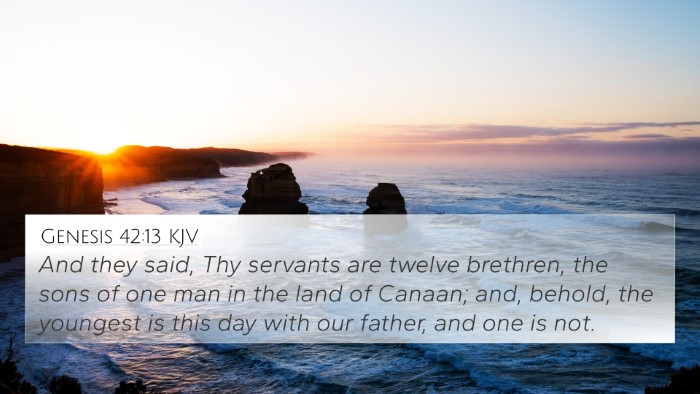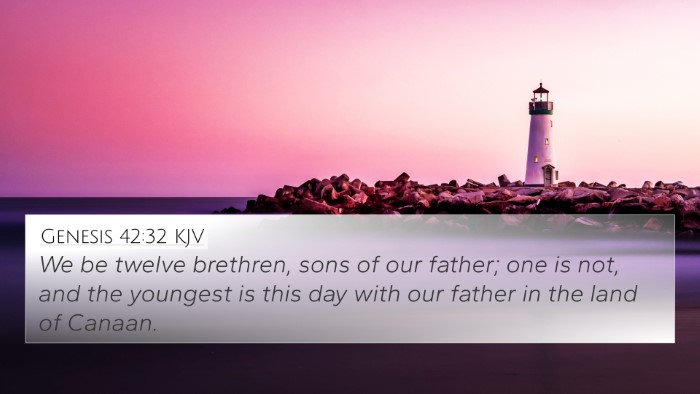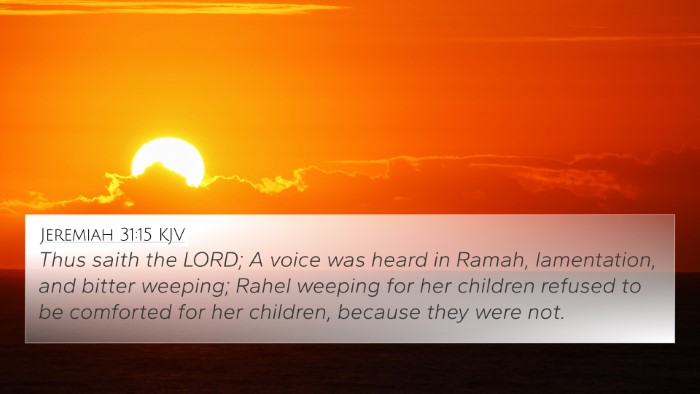Genesis 37:30 - Understanding the Context and Meaning
Genesis 37:30 reads: "And he returned unto his brethren, and said, The child is not; and I, whither shall I go?" This verse captures a pivotal moment in Joseph's story as it highlights the deceit and turmoil within his family. The following summary provides insights from various public domain commentaries to illuminate the depth of this passage.
Commentary Insights
- Matthew Henry: Henry emphasizes the emotional turmoil Joseph's brothers faced as they deceived their father Jacob. The phrase "The child is not" reflects not only the loss of Joseph but also the guilt that haunts the brothers. Henry notes the irony and tragedy of the situation—while they wanted to rid themselves of Joseph, they would ultimately lose their father's trust and create a rift within the family.
- Albert Barnes: Barnes focuses on the implications of the deceit. He points out that this moment symbolizes the inner conflict of the brothers. The question "whither shall I go?" signifies their despair and anxiety about their actions. They are trapped—not just in their lies but also in a sense of impending judgment for what they have done to Joseph.
- Adam Clarke: Clarke notes that this episode is more than a tragic family matter; it represents a fundamental moral lesson about the consequences of sin. The text invites readers to examine the broader themes of betrayal, guilt, and the search for redemption that weave throughout the biblical narrative. Clarke suggests that this moment sets the stage for Joseph's eventual rise, providing a dual narrative of despair and hope.
Thematic Connections
Looking deeper into Genesis 37:30, we find it resonates with several major themes found throughout the Bible:
- Betrayal: The actions of Joseph’s brothers parallel the betrayal seen in the New Testament with Judas Iscariot’s betrayal of Jesus (Matthew 26:14-16).
- Guilt and Consequences: The brothers' struggle foreshadows the themes of guilt evident in Psalm 32:3-4, where David reflects on unconfessed sin.
- Divine Providence: Even in their wrongdoing, God’s plan is at work, reflected later in Romans 8:28, which states that God works for the good of those who love Him.
- Redemption: The journey of Joseph from suffering to success is echoed in the wider biblical theme of redemption found in Galatians 3:13.
Cross-References
This verse connects with several other Scriptures, enriching its meaning through the lens of cross-referencing:
- Genesis 37:18-20: The plot to kill Joseph initiated by his brothers.
- Genesis 42:21-22: The brothers face their guilt when they are confronted by Joseph in Egypt.
- Hebrews 12:15: A reminder to avoid root of bitterness, reflective of the brothers' actions.
- Matthew 27:3: Judas’ remorse parallels the brothers’ guilt for their actions.
- 1 John 1:9: God's promise of forgiveness if we confess our sins, inviting reflection on the theme of repentance.
- Proverbs 28:13: Highlights the importance of confessing rather than concealing sins, applicable to the brothers’ deceit.
- Genesis 50:20: Joseph's later words to his brothers reaffirming that God intended their actions for good, showcasing the overarching theme of divine sovereignty.
Application and Reflection
Genesis 37:30 serves as a sobering reminder of the consequences of deceit and the complex dynamics of familial relationships. Reflecting on this verse encourages readers to consider their own actions and motivations, and to seek honesty in their dealings with others.
As we explore this passage, we gain insight into the interconnectedness of biblical themes, illustrating how Scripture speaks to the human experience across time. Those interested in cross-referencing biblical texts can utilize various tools like a Bible concordance or Bible cross-reference guide to deepen their understanding of these connections.
Conclusion
In summary, Genesis 37:30 highlights the intricate web of human emotions and divine providence. Studying this verse alongside others through cross-referencing Bible study methods allows for a richer interpretation of the biblical text, inviting readers to engage deeply with the narrative of Scripture. This holistic approach to understanding biblical texts fosters a greater appreciation for the themes of betrayal, guilt, and ultimately, redemption that are laced throughout the Bible.







